- Home
- Andy McNab
NS13 Zero Hour Page 2
NS13 Zero Hour Read online
Page 2
I did a quick calculation to make sure I wasn’t about to fuck up. ‘Roger that. Fifty-nine, fiver-niner. That’s minus fifty. Minus fiver zero. Over.’
I wanted to make sure I got this right first time. I’d only have one chance to confirm it. The password was nine. To get 59, you had to take off 50. If he had said 02, I’d have said plus 07.
‘This is Cody Zero One. Ra’am is not airborne. Acknowledge.’
‘Roger that, Cody Zero One. Ra’am not airborne. Out.’
I wasn’t cutting off the phone. I was just making sure he didn’t rattle on with the commentary until I needed to know.
Pilots all over the world like to give themselves nicknames. There are Lightning Strikes, Cobras, Hell Hawks, Flying Buccaneers - all sorts going on. 69th Squadron of the Israeli Air Force called themselves Ra’am - the Hebrew for thunder.
It was hard not to take the piss, but then again, I wasn’t an Israeli with a fucking great mushroom cloud taking shape right on my doorstep. Nor was I a Yank with worries about what the fervently anti-American Iranians were up to. I was just a Brit low down the food chain doing a job, and that was the way I liked it.
I unzipped the day sack. First out was my very Gucci Nikon digital camera, together with the world’s supply of lenses and all the leads and bits and pieces to download pictures onto my Sony notebook. I’d had to explain to Security that I used the extending umbrella with the silver-coated interior as a reflector to help with my photography. These three bits of kit were all I was going to need to do my bit of the job.
The Brits had confirmed that al-Kibar was a nuclear plant. Up until then, the Israelis had had no concrete evidence of its use - or who was helping build it. All they knew was that the Syrians received high-ranking military delegations from North Korea. Mossad was convinced that they were intent on upgrading Syria’s military capabilities. North Korea had already helped Damascus develop medium-range ballistic missiles, and chemical weapons such as Sarin and mustard gas. So were they now taking them to the next level?
If that was the case, Israel would retaliate exactly the same as it had in Iraq in 1981 - when they flew over the border and bombed the fledgling Osirak reactor near Baghdad back to the Stone Age. There was no fucking about. They asked no one. They just went and did it. They broke international law, but nobody gave a shit. The only victim was Saddam. The fact that they themselves had nuclear weapons didn’t come into the equation. A lot of people belonged to that club. Even Pakistan and India were members. But the line in the sand had to be drawn at Axis-of-Evil countries, like Syria and Iran.
The Israelis suspected what was happening at al-Kibar, but they lacked hard intelligence. And Syria was a different kettle of fish from Iraq. Washington wouldn’t back an attack without the int. But then things changed. In November 2006 Mossad came to the Brits for help. A senior Syrian official was staying at a big fancy hotel in Kensington that cost PS1,600 a night. The Security Service went in and had a mince around. The guy had been incredibly careless. He’d gone out for the night and left his laptop in his room. MI5 opened up the back and inserted a Trojan horse program. Over the next couple of months, they drained out the construction plans for al-Kibar, together with hundreds of emails and photographs.
The photographs did the most damage. They showed the complex at various stages of construction since 2002. The main building looked like a tree-house on stilts, with pipes leading into a pumping station on the banks of the Euphrates. It was going to need a lot of water to create fissile material. As the building grew, it sprouted concrete piers and roofs, which could only have one function - to camouflage the place from above. Al-Kibar’s core design, they could now prove, was the same as North Korea’s Yongbyon reactor, even down to the number of holes for fuel rods.
The clincher was a photo that showed an Asian guy in blue tracksuit trousers standing next to one of the Arabs who’d been working there all the time. The Brits quickly identified the Asian as Chon Chibu. He was the chief engineer behind the North Koreans’ plutonium reactor at Yongbyon.
The Israelis were wetting themselves with this int, but it still wasn’t enough for the US. Washington thought it would be years before the Syrians were capable of producing a bomb. They could be fucked up without the US getting drawn into another war.
Things might have stayed that way had not a high-ranking Iranian decided to switch sides. General Ali-Reza Asgari was a massive catch. Head of Iran’s Revolutionary Guard in Lebanon in the eighties, he’d become Iran’s deputy defence minister in the mid-nineties. His fall from grace had come after the election victory of hardliner Mahmoud Ahmadinejad in 2005. Asgari had branded several of those close to the new president as corrupt. He was living on borrowed time.
The Iranian general was an intelligence goldmine. He confirmed that Tehran was building a second, secret, plant in addition to the uranium enrichment plant in Natanz, already known to the West. And that Iran was funding a top-secret nuclear project in Syria, launched in co-operation with the North Koreans.
Finally, the US had to sit up and take notice. The UK would be standing shoulder to shoulder with them, and sharing blood. That blood, of course, was going to be mine if I fucked up. From swanky executive suites in Kensington to high-profile defectors larging it in Washington, the operation had now come down to Cody munching doughnuts in Nevada, and me sitting in a dingy hotel room checking my watch.
In exactly fourteen minutes, a bright flash would light up the night in the distant desert, followed by the sound of thunder that would signal Armageddon.
3
I plugged the laptop into the wall socket, let it sort itself out, and unfurled the umbrella. I extended the handle, pulled off the small plastic knob at the end and lifted the cap beneath it to reveal a USB slot. I placed what was now a satellite dish on the floor by the open window.
Six floors below me, giggly Brits headed back to the hotel against the hum of traffic. Long fluorescent tubes dangled outside a line of shops to show off the goods on display. Above me hung a huge blanket of stars. In the middle distance, between the stars and the city, lay the inky blackness where the desert took over. Out there somewhere, oblivious to what was on its way, was al-Kibar.
The 200mm zoom lens was much heavier than the others. It housed a lithium battery that could power the device on its own or become an instant backup if the local grid cut out. I ran a lead from it into the USB slot in the top of the umbrella. Another USB wire ran from the camera to the laptop. Its screen was now displaying thumbnails of the hundreds of pictures I’d been taking to make my cover story stand up.
I hit the blue circle icon to open the programme.
‘This is Cody Zero One. Ra’am are airborne - Ra’am are airborne. Acknowledge.’
‘Roger that, Cody Zero One. Ra’am airborne.’
I checked my G-Shock: 23.26. I fired up my countdown display. GCHQ had pre-set it at eighteen minutes.
The F-15s had taken off from Ramat David Air Base, just south of Haifa on the Mediterranean coast. It was also near Megiddo, which, according to Baltasar and the Book of Revelation, would be one of the sites of the final battle between good and evil. That seemed appropriate. The attack on al-Kibar was certainly going to be Biblical.
Ten fast jets would take part in the initial attack, though only seven would be coming my way. For now all ten headed west, out into the Mediterranean. It was a decoy manoeuvre. Both the Turks and the Syrians would be tracking them. Everybody wants to know what the Israelis are up to 24/7 in this part of the world.
The screen displayed an empty bar chart. The Tefalheads at GCHQ who’d put this together must have realized that I needed everything to be as simple as possible. I turned off the lights and picked up the umbrella so that the inside and the shaft pointed out of the window. I moved it up and down and side to side until the bar chart was about three-quarters full of green. It was the best I could do and all that was needed.
I propped the umbrella on a chair and anchored it across the handle
with my pillow.
‘This is Cody Zero One. Ra’am first wave ready to go active.’
I adjusted the dish. ‘Roger that, Cody Zero One. I am seven-five, seventy-five per cent. Over.’
‘Roger that, James Zero Two. Seven-fiver. Good to go. Stand by.’
Someone somewhere counted down Ra’am’s first wave on a radio. It was slow, guttural and very Israeli. ‘Five - four - three - two - one - go, go, go.’
‘This is Cody Zero One. Ra’am first wave active. Acknowledge.’
‘Roger that, Cody Zero One. I’m still seven-fiver.’
Three of the ten F-15s had peeled off and headed east-north-east towards the Syrian border. They were going to attack the radar site at Tall al-Abuad with their Maverick missiles and 500-pounders. The moment that happened, the stakes would be raised. Every unit near the border would hear what was going on, and the Syrian military would start flapping big-time.
All I could do now was listen as Cody gave the running commentary. I needed a picture in my head of what was happening. So did the other guy listening in. Ehud Olmert, the Israeli prime minister, was taking personal responsibility for the Ra’am part of this attack. I was sure his surroundings were a little more comfortable than mine.
‘This is Cody Zero One. Ten seconds to contact.’
I counted them down on my second-hand.
‘First attack - ordnance deployed. Contact, contact, contact. Second attack …’
There was a pause.
Cody was waiting for the Mavericks from the second wave to deploy as he watched the target on his screens. He’d be looking for the splashes all over the night-vision thermal imagery as bombs and missiles hit the radar installation.
‘Ordnance deployed. Contact, contact, contact. Third attack …’
Another pause, shorter this time.
‘Weapons deployed.’ For Cody, it would have been like watching a video game. ‘Contact, contact, contact.’
That was the radar defences fucked up.
‘Ra’am second wave now active … James Zero Two, acknowledge.’
‘Roger that, Cody Zero One. I still have seven-fiver.’
The seven remaining F-15s were now screaming towards the Syrian border to break through the secure corridor that had been opened by the attack. From the moment they hit Syrian air space, it was exactly eighteen minutes to target.
Cody couldn’t help himself now. There was excitement in his voice. ‘Ra’am second wave - now in the combat box. James Zero Two, all yours - acknowledge.’
‘Roger that, Cody Zero One.’
I hit my countdown timer. My eyes were glued to the screen. I wasn’t sure what to do if the bar percentage dropped. Fuck about with the umbrella, I supposed.
The F-15s would be virtually hugging the ground to avoid being illuminated. Now the border had been attacked, ground-to-air missile systems would be searching the sky. They wouldn’t know what the fuck was going on, but they’d know there had been an attack on their air defences, and that meant there was going to be an air incursion. But what type? Jets? Ground troops? A combination? There’d be nothing for them to latch onto just yet, but Ra’am couldn’t hug the desert for ever. They were going to have to gain height in excess of 8,000 feet in order to assume their attack profiles. That was where I came in: if I didn’t fuck up the Russian-made Tor-M1 and Pechora-A2 surface-to-air missiles that were protecting al-Kibar, they were going to fuck up Ra’am, and it really would be Armageddon.
Everything fell silent. Cody, me, Ehud Olmert - we were all holding our breath. Even the noise outside was blocked as I kept my eyes glued to the screen and the bars fluctuated between 73 and 75.
I checked the timer. Fourteen minutes fifteen seconds to go. I turned back to the screen. My laptop was linked by satellite to America’s Suter airborne-attack system. This package could feed enemy radar emitters with false targets, and even directly manipulate the Tor-M1 and Pechora-A2 sensors so they closed down completely. And that was what was happening now - or, at least, I hoped it was. I was directly attacking the microprocessors within the Syrian missile systems. It was easy enough. The chips had had kill switches programmed into them. When I hit the go button, I’d be sending a pre-programmed code to those chips, enabling Suter to override and tell the system what to do.
Syria’s missile systems might have been built in Russia, but the chips inside them hadn’t. Russia had been in shit state for years after the collapse of the Iron Curtain. Bizarre as it seemed, they plugged the gap by buying microchips off-the-shelf from Taiwan and the West. Washington and London weren’t slow to catch on. As soon as they found out what was happening, they mobilized their Tefalheads. Microchips bound for Moscow and other unfriendly states were either reprogrammed or built from scratch with back doors or kill switches installed. Until they twigged, the West would be at liberty to disable whole weapons systems at will.
It wasn’t the first time the Russians and their various mates had been at the sharp end of this particular conjuring trick. In 2004, the CIA inserted a software Trojan horse into computing equipment bought from Canadian suppliers to control a trans-Siberian gas pipeline. A three-kiloton explosion tore the pipeline apart; the detonation was so large it was visible from outer space.
The radar systems on the border were old Soviet-era kit and didn’t have the kill switches, so they had to be hammered the old-fashioned way. The Syrians also had the newer, state-of-the-art Russian Pantsyr-S1E missile systems, but luckily for us they wouldn’t be operational for a month. I guessed that was a reason we were pushing ahead with the attack.
There was a distant rumble in the sky. It could only mean one thing. The F-15s’ engines were on full thrust to push them up from the sand. At 8,000 feet they’d acquire the target and scream down towards it at forty-five degrees. That was when they were at their most vulnerable. If I fucked up, they could be illuminated.
I didn’t even bother looking out of the window. They were miles away in the darkness.
I looked at the timer. Fifty-eight seconds until the first attack.
There was a loud thump.
Then another.
I glanced at my watch as the door took another pounding. There was nowhere to run. I had to stay and make sure this shit worked.
‘Nick … ?’
I gave a low groan. ‘I’m sleeping.’
Cody sparked up in my earpieces. ‘First attack - ordnance deployed.’
‘Shorry … Nick …’ Her voice was slurred. It sounded like she had her face pressed against the door. ‘I was wondering … if you fancied a drink. Maybe I could bring a bottle up?’
‘Contact, contact, contact.’
There was a distant flash of sheet lighting, then another, from the strip of darkness between the city and the stars. A few seconds later, the pressure waves from the first series of explosions rumbled over the rooftops.
Cody continued his commentary as the next Ra’am rolled down into the target.
‘Nick? Did you hear that? What was that?’
‘Thunder … There’s a storm out there.’
The screen still showed 73-75 per cent. There were more flashes and rumbles as the seven F-15s kicked away at the target.
Cody gobbed off in my ear and the thunder continued to roll. I muted the BlackBerry. ‘Tell you what, Di, give me ten minutes and I’ll see you down at the bar.’
She rattled on the door with both hands to mimic the explosions. ‘Better bring that umbrella of yours.’
Another lightning bolt flashed on the horizon, then faded with her laughter as she headed back along the corridor.
PART TWO
1
Tuesday, 9 March 2010
12.50 hrs
It wasn’t supposed to be this way.
I leant against the triple-glazed floor-to-ceiling windows of my penthouse apartment and tried to look out over Docklands, but the stabbing pain in my head played havoc with my vision. It felt like I was swimming through a pool full of razorblades.
The glass-and-steel monolith had had its final lick of paint the day Lehman Brothers had gone belly-up and the owner was no longer flashing the cash. ‘Their crunch is your lunch,’ the overly pushy estate agent told me, with a megawatt grin and flash of racing-car cufflinks. ‘If you’ve got cash on the hip, you can really clean up at times like this.’
I’d been penniless through every other recession in living memory, so it seemed like a nice idea. And I’d loved everything about this place, from the dual-aspect reception room opening on to the roof terrace to the secure underground parking space; from the granite worktops to the limestone bath with integrated TV; from the private balcony and walk-in wardrobe that hadn’t yet been filled, to the guest bedroom with the cantilevered glass pod sticking out over the dock.
It was like something out of a Bond film. The photochromic glass frontage darkened when the sun got too bright during the day, and the night-time views across to the Canary Wharf towers and the glistening river beneath were so fantastic I never closed the blinds.
Before the headaches had begun I’d just sit there with a brew, mesmerized by the aircraft warning lights. If I needed a change of scenery I’d wander over to the other side of the apartment and gaze past Tower Bridge towards the mishmash of South London estates that used to be my manor. As a kid I’d looked back across the water and thought the disused ware-houses and crumbling tenements along this stretch were even worse than the shithole I called home, but Docklands was a very different story now. And so was what had been happening inside my head for over a week.
‘You OK, Nick?’
Julian was sitting on one of my fancy leather armchairs, working his way through my supply of coffee capsules.
I didn’t look round. ‘Yes, mate.’
I wasn’t about to tell him the truth. I didn’t like people worrying about me. It made me uncomfortable. No one had given a fuck about me when I was a kid, and I’d got to prefer it that way.

 Get Me Out of Here!
Get Me Out of Here!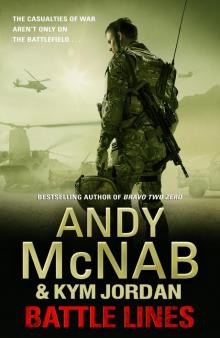 Battle Lines
Battle Lines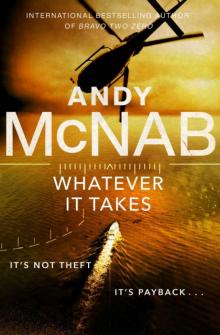 Whatever It Takes
Whatever It Takes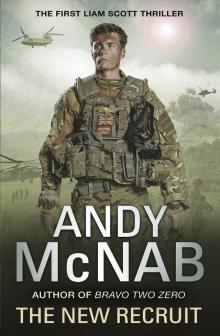 The New Recruit
The New Recruit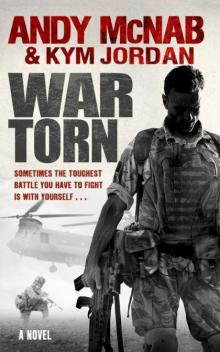 War Torn
War Torn Brute Force
Brute Force Crossfire
Crossfire Dark Winter ns-6
Dark Winter ns-6 The Grey Man
The Grey Man Spoken from the Front
Spoken from the Front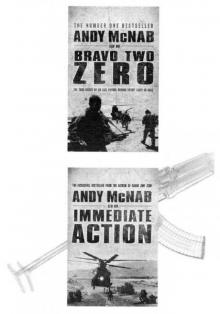 Meltdown
Meltdown Recoil
Recoil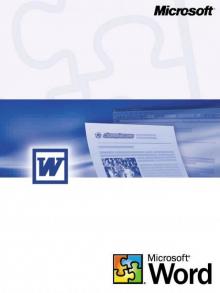 Nick Stone 1 - Remote Control.
Nick Stone 1 - Remote Control.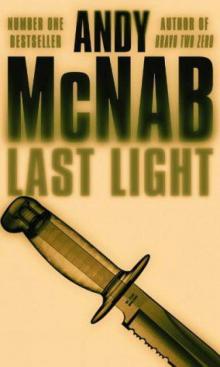 Last Light ns-4
Last Light ns-4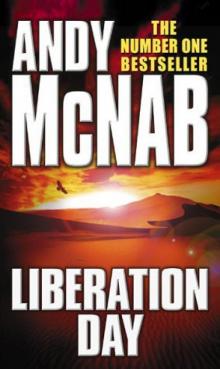 Liberation day
Liberation day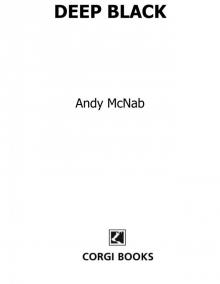 Deep Black
Deep Black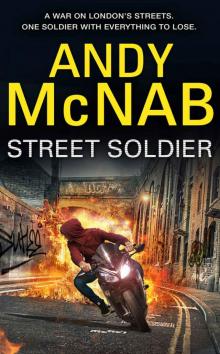 Street Soldier
Street Soldier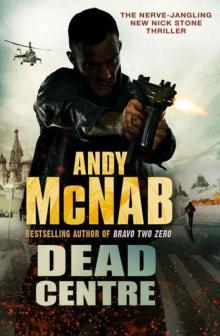 Dead Centre ns-14
Dead Centre ns-14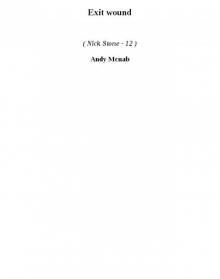 Exit wound ns-12
Exit wound ns-12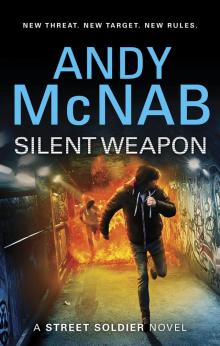 Silent Weapon
Silent Weapon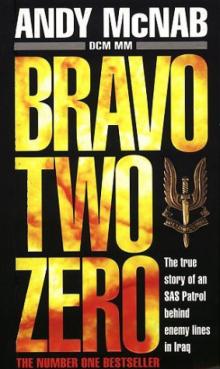 Bravo two zero
Bravo two zero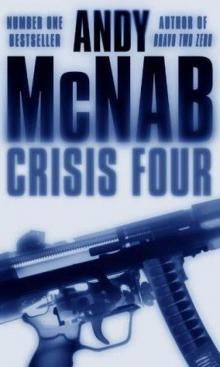 Crisis Four ns-2
Crisis Four ns-2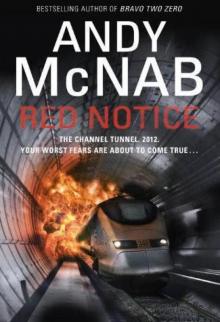 Red Notice
Red Notice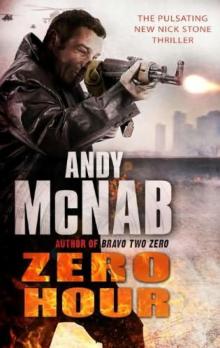 NS13 Zero Hour
NS13 Zero Hour Firewall
Firewall Last Light
Last Light Aggressor
Aggressor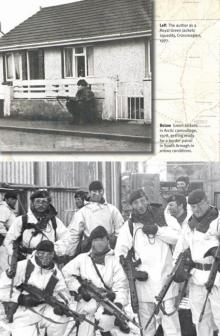 Seven Troop
Seven Troop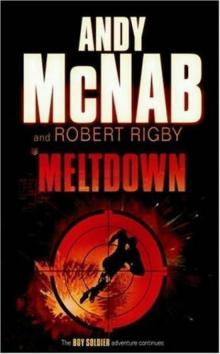 Meltdown bs-4
Meltdown bs-4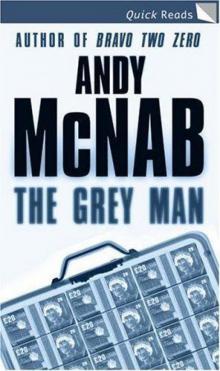 The Grey Man (quick reads)
The Grey Man (quick reads) The New Enemy
The New Enemy Avenger
Avenger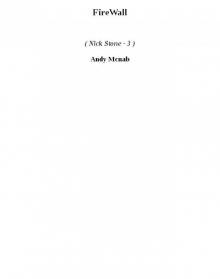 FireWall ns-3
FireWall ns-3 Silencer
Silencer Last Night-Another Soldier…
Last Night-Another Soldier…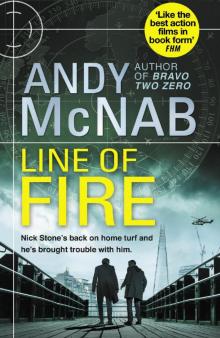 Line of Fire:
Line of Fire: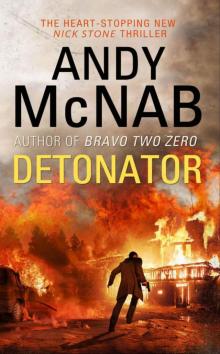 Detonator
Detonator Deep Black ns-7
Deep Black ns-7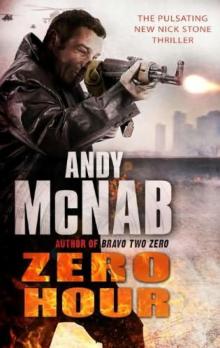 Zero Hour (2010) ns-13
Zero Hour (2010) ns-13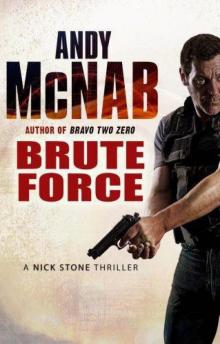 Brute Force ns-11
Brute Force ns-11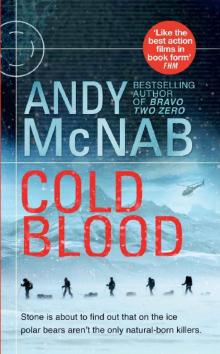 Cold Blood
Cold Blood Terminal Velocity
Terminal Velocity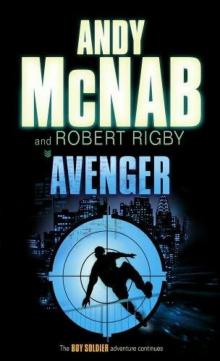 Avenger bs-3
Avenger bs-3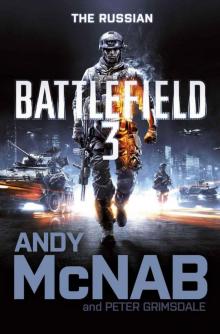 Battlefield 3: The Russian
Battlefield 3: The Russian DropZone
DropZone Zero Hour
Zero Hour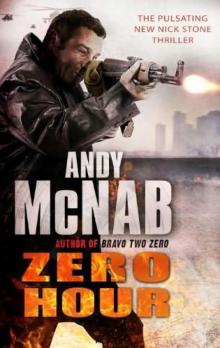 NS13 Zero Hour (2010)
NS13 Zero Hour (2010)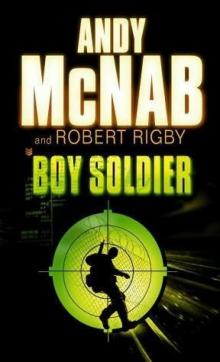 Boy soldier bs-1
Boy soldier bs-1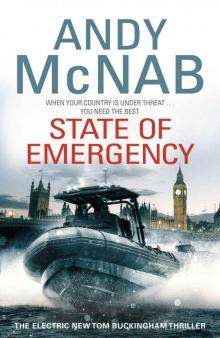 State Of Emergency: (Tom Buckingham Thriller 3)
State Of Emergency: (Tom Buckingham Thriller 3)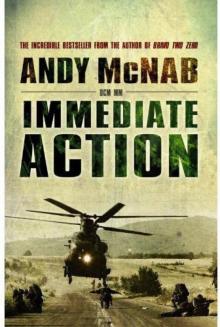 Immediate Action
Immediate Action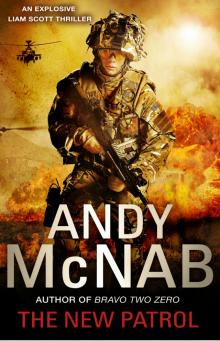 The New Patrol
The New Patrol Crisis Four
Crisis Four Boy Soldier
Boy Soldier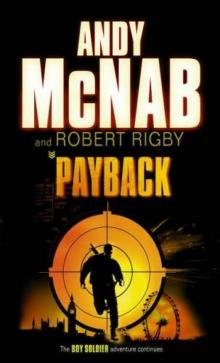 Payback bs-2
Payback bs-2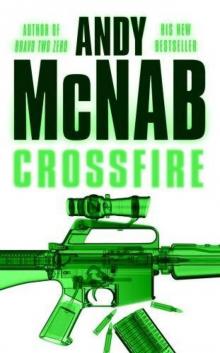 Crossfire ns-10
Crossfire ns-10 Today Everything Changes: Quick Read
Today Everything Changes: Quick Read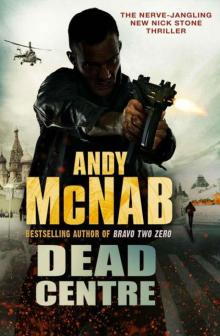 Dead Centre
Dead Centre For Valour
For Valour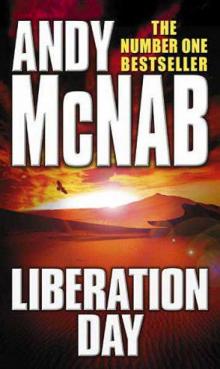 Liberation Day ns-5
Liberation Day ns-5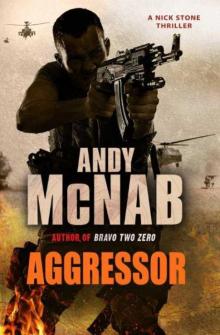 Aggressor ns-8
Aggressor ns-8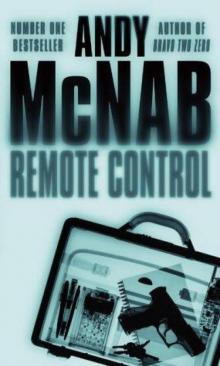 Remote Control ns-1
Remote Control ns-1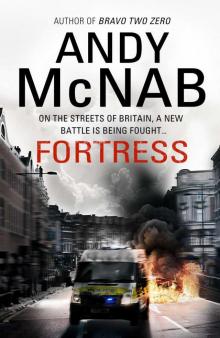 Fortress
Fortress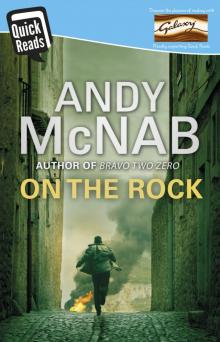 On the Rock
On the Rock Dark Winter
Dark Winter